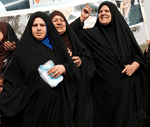Published on Thu, 2012-02-09 08:34
A team of scientists from the Max Planck Institute for Evolutionary Biology in Germany found critical failures in the regulatory processes of the first three countries (Malaysia, US and the Cayman Islands) permitting releases of genetically modified (GM) insects in terms of transparency and scientific quality, reported the Third World Network Biosafety Information Service. |
Published on Wed, 2012-02-08 12:21
Members of the Iraqi Parliament promised to make serious efforts to approve laws in order to ensure all women the enjoyment of their social and economic rights, guaranteed by the Constitution, at the request of Iraqi Al-Amal Association, focal point of Social Watch in that country. |
Published on Tue, 2012-02-07 07:56
The civil society organizations gathered in Social Watch Benin invited the incumbent President of Senegal, Abdoulaye Wade, who is seeking a third term in office, “to take a peaceful retirement,” the network said in a statement published on Thursday. |
Published on Mon, 2012-02-06 07:50
Political leaders boast that the Canadian economy has fully recovered from the recession, and that it was not as severe there as it was in other countries. It turns out that both of those claims are false because they don't take population growth into consideration, according to a study released by the Canadian Centre for Policy Alternatives (CCPA, one of the focal points of Social Watch) |
Published on Fri, 2012-02-03 07:38
New factors in deforestation like the world economic crisis, speculation in markets for basic products and arable land, and worsening poverty and climate change are aggravating the old causes of this phenomenon such as the advance of agricultural frontiers, tree cutting for timber and fuel, and the use of wood as a fuel. This problem is reported and documented in the Social Watch Report 2012. |
SUSCRIBE TO OUR NEWSLETTER







